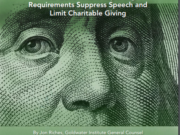The New York Times recently published an opinion piece by David Primo, one of CCP’s academic advisers. Prof. Primo’s article, while given the provocative title “Against Disclosure,” is far more modest in tone and substance than that heading implies. Prof. Primo points to an empirical study that he conducted, the findings of which were published in the peer-reviewed Election Law Journal. The study found that campaign finance disclosure data might not actually be terribly useful in helping voters determine who could benefit from passage or defeat of a ballot measure.
The Sunlight Foundation’s Lee Drutman responded on his group’s blog. He argues that the Times piece “does not demonstrate a single cost of campaign finance disclosure.” But this is not so. Mr. Primo pointedly references the effects of Target being forced to “ma[k]e public its contribution to a pro-business group…political spending [that] was almost certainly, on balance, in line with the interests of the corporation.” Target faced a boycott that gained national media attention by gay rights activists upset that the pro-business group Target supported went on to support a candidate for governor who opposed gay marriage.
In the Times piece, Primo writes that the effect of this campaign finance disclosure was that “activists were able to manufacture a problem for Target that disrupted its operations.” That sure sounds like a cost of disclosure.
Primo further notes that other forms of disclosure “can alter the incentives of corporate managers in counterproductive ways.” He cites a study showing “that mandated disclosure leads corporate managers to prefer decisions that produce favorable, verifiable information — like taking steps to increase short-term profits — over actions that may be better for the company in the long run but do not produce easily measurable data.”
Mr. Drutman continues his rebuttal by emphasizing that a survey used by Primo in his paper was funded by the Institute for Justice (IJ), who in turn is funded by the ever-popular Koch Brothers. The relevance of the Koch connection is never spelled out, presumably because the Sunlight Foundation assumes that mere association with an organization that associates with the billionaire siblings sufficiently places individual’s objectivity under suspicion. [UPDATE: It turns out that Drutman’s Koch funding allegations are wrong too. See the update below.]
But it’s hardly surprising that Prof. Primo’s research was supported by those with whom he is intellectually aligned. Certainly, it’s no more surprising than the fact that the Sunlight Foundation’s contributors include George Soros’s Open Society Institute and the Rockefeller Foundation. Or that it is a member of the Corporate Reform Coalition, whose opposition to corporate speech is supported by, unsurprisingly, a number of unions and liberal politicians.
Mr. Drutman also makes much of linking Prof. Primo to Paul Sherman, an IJ attorney (Mr. Sherman has worked with CCP on campaign finance cases, and previously served as our Associate Director), for proof that “the Institute for Justice opposes disclosure and campaign finance laws.” Such a sweeping statement is simply false. Mr. Sherman and IJ—like CCP—have certainly fought some campaign finance disclosure laws, but a look at Mr. Sherman’s cases is instructive. For the most part, his efforts involve representing small groups of people, spending far less than a thousand dollars, who are persecuted by more sophisticated actors for failing to file meaningless forms. Put differently: Mr. Sherman represents those who most directly experience the costs of disclosure.
Illustrative is Sampson v. Buescher. In that case, citizens who did not wish to see their town annexed by a larger neighbor attempted to oppose a ballot measure that, if successful, would lead to annexation. They spent small sums on grassroots activities (i.e. purchasing signs), and ended up in court for their trouble—from a lawsuit filed by well-funded supporters of annexation seeking to silence opposition. Four years later, the U.S. Court of Appeals for the Tenth Circuit ruled that Colorado law on the subject—which requires registration as a political committee and disclosing minor transactions after spending a mere $200—could not be constitutionally applied to this small group. In fact, the Court made a point of noting that the cost of complying with the law was arguably greater than the cost of the group’s political speech. Surely that counts as a cost?
As for Mr. Drutman’s criticisms of Mr. Primo’s Election Law Journal article, he clearly did not like the results. But Mr. Primo’s findings were published in a peer-reviewed journal, and the Primo-Prabhat study represents a significant piece of academic work. The Journal, by the way, is no Koch-funded, disclosure-quashing, Super-PAC-snuggling rag. The editorial board includes Trevor Potter, Thomas Mann, Pam Karlan, and Heather Gerken. Hardly a Who’s Who of First Amendment aficionados.
Mr. Drutman, while free to dispute the validity of Mr. Primo’s work, should handle the discussion on the merits of the study and on the merits of Mr. Primo’s modest conclusion—that disclosure may have significant costs, and sometimes carries few benefits.
Instead, Mr. Drutman engaged in ad hominem attacks designed to discredit Mr. Primo. Such a wildly disproportionate response ought to give the thoughtful reader some pause about the blind allegiances of those who seem to believe there are no costs to political disclosure.
He ends by claiming that “we at Sunlight welcome a conversation about the impacts of disclosure,” but there is no evidence on the Sunlight website that the group has ever had a conversation about, or has any interest in, the impacts of disclosure. There is one ironic twist: Sunlight does not disclose donations of $250 or less, an amount much higher than required in Florida’s disclosure laws, where Prof. Primo surveyed voters for his research.
UPDATE: IJ’s Paul Sherman sent me an e-mail with more information on Drutman’s claims about Koch funding, which I reprint here with his permission:
Mr. Drutman’s claim that the Institute for Justice is “funded by the Koch Brothers” is not just irrelevant, as you point out, but also incorrect. Although it is true that Charles and David Koch have provided generous support to IJ over the years—for which we have always been grateful—Mr. Drutman’s claim is based on single, 12-year-old newsletter article that does not reflect our current funding. Charles Koch has not given us any money since 1997. And although David Koch continues to make contributions to IJ, those contributions amount to less than 1% of our annual budget.
Mr. Drutman can be faulted for either not suspecting or not caring that a 12-year-old newsletter article might not contain up-to-date information on IJ’s funding. But the fact that he thought his claims about IJ’s funding would be rhetorically effective is itself a wonderful illustration of a point that IJ has repeatedly made: that disclosure tends to encourage a simplistic, ad hominem, follow-the-money narrative that cheapens the debate over important political issues.














